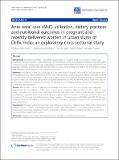| dc.contributor.author | Ghosh-Jerath, Suparna | en_US |
| dc.contributor.author | Devasenapathy, Niveditha | en_US |
| dc.contributor.author | Singh, Archna | en_US |
| dc.contributor.author | Shankar, Anuraj | en_US |
| dc.contributor.author | Zodpey, Sanjay | en_US |
| dc.date.accessioned | 2015-05-04T15:26:19Z | |
| dc.date.issued | 2015 | en_US |
| dc.identifier.citation | Ghosh-Jerath, Suparna, Niveditha Devasenapathy, Archna Singh, Anuraj Shankar, and Sanjay Zodpey. 2015. “Ante natal care (ANC) utilization, dietary practices and nutritional outcomes in pregnant and recently delivered women in urban slums of Delhi, India: an exploratory cross-sectional study.” Reproductive Health 12 (1): 20. doi:10.1186/s12978-015-0008-9. http://dx.doi.org/10.1186/s12978-015-0008-9. | en |
| dc.identifier.issn | 1742-4755 | en |
| dc.identifier.uri | http://nrs.harvard.edu/urn-3:HUL.InstRepos:15034840 | |
| dc.description.abstract | Background: Antenatal Care (ANC) is one of the crucial factors in ensuring healthy outcomes in women and newborns. Nutrition education and counselling is an integral part of ANC that influences maternal and child health outcomes. A cross sectional study was conducted in Pregnant Women (PW) and mothers who had delivered in the past three months; Recently Delivered Women (RDW) in urban slums of North-east district of Delhi, India, to explore ANC utilization, dietary practices and nutritional outcomes. Methods: A household survey was conducted in three urban slums to identify PW and RDW. Socio-economic and demographic profile, various components of ANC received including nutrition counselling, dietary intake and nutritional outcomes based on anthropometric indices and anaemia status were assessed. Socio-demographic characteristics, nutrient intake and nutritional status were compared between those who availed ANC versus those who did not using logistic regression. Descriptive summary for services and counselling received; dietary and nutrient intake during ANC were presented. Results: Almost 80% (274 out of 344) women received some form of ANC but the package was inadequate. Determinants for non-utilization of ANC were poverty, literacy, migration, duration of stay in the locality and high parity. Counselling on nutrition was reported by a fourth of the population. Nutrient intake showed suboptimal consumption of protein and micronutrients like iron, calcium, vitamin A, vitamin C, thiamine, riboflavin niacin, zinc and vitamin B12 by more than half of women. A high prevalence of anaemia among PW (85%) and RDW (97.1%) was observed. There was no difference in micronutrient intake and anaemia prevalence among women who received ANC versus who did not. Conclusions: Pregnant women living in urban poor settlements have poor nutritional status. This may be improved by strengthening the nutrition counselling component of ANC which was inadequate in the ANC package received. Empowering community based health workers in providing effective nutrition counselling should be explored given the overburdened public health system. | en |
| dc.language.iso | en_US | en |
| dc.publisher | BioMed Central | en |
| dc.relation.isversionof | doi:10.1186/s12978-015-0008-9 | en |
| dc.relation.hasversion | http://www.ncbi.nlm.nih.gov/pmc/articles/PMC4396888/pdf/ | en |
| dash.license | LAA | en_US |
| dc.subject | Pregnancy | en |
| dc.subject | Antenatal care | en |
| dc.subject | Nutritional status | en |
| dc.subject | Nutrition counselling | en |
| dc.subject | Dietary intake | en |
| dc.title | Ante natal care (ANC) utilization, dietary practices and nutritional outcomes in pregnant and recently delivered women in urban slums of Delhi, India: an exploratory cross-sectional study | en |
| dc.type | Journal Article | en_US |
| dc.description.version | Version of Record | en |
| dc.relation.journal | Reproductive Health | en |
| dash.depositing.author | Shankar, Anuraj | en_US |
| dc.date.available | 2015-05-04T15:26:19Z | |
| dc.identifier.doi | 10.1186/s12978-015-0008-9 | * |
| dash.contributor.affiliated | Shankar, Anuraj | |


